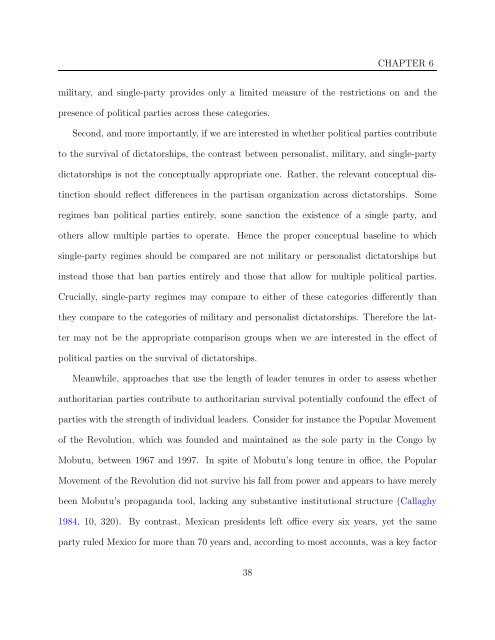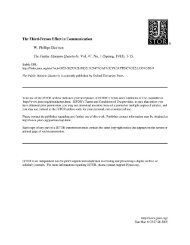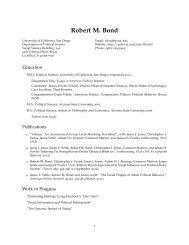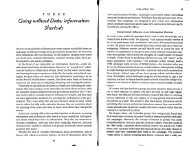Chapter 6 Why Authoritarian Parties? The Regime Party as an ...
Chapter 6 Why Authoritarian Parties? The Regime Party as an ...
Chapter 6 Why Authoritarian Parties? The Regime Party as an ...
You also want an ePaper? Increase the reach of your titles
YUMPU automatically turns print PDFs into web optimized ePapers that Google loves.
CHAPTER 6<br />
military, <strong>an</strong>d single-party provides only a limited me<strong>as</strong>ure of the restrictions on <strong>an</strong>d the<br />
presence of political parties across these categories.<br />
Second, <strong>an</strong>d more import<strong>an</strong>tly, if we are interested in whether political parties contribute<br />
to the survival of dictatorships, the contr<strong>as</strong>t between personalist, military, <strong>an</strong>d single-party<br />
dictatorships is not the conceptually appropriate one. Rather, the relev<strong>an</strong>t conceptual dis-<br />
tinction should reflect differences in the partis<strong>an</strong> org<strong>an</strong>ization across dictatorships. Some<br />
regimes b<strong>an</strong> political parties entirely, some s<strong>an</strong>ction the existence of a single party, <strong>an</strong>d<br />
others allow multiple parties to operate. Hence the proper conceptual b<strong>as</strong>eline to which<br />
single-party regimes should be compared are not military or personalist dictatorships but<br />
instead those that b<strong>an</strong> parties entirely <strong>an</strong>d those that allow for multiple political parties.<br />
Crucially, single-party regimes may compare to either of these categories differently th<strong>an</strong><br />
they compare to the categories of military <strong>an</strong>d personalist dictatorships. <strong>The</strong>refore the lat-<br />
ter may not be the appropriate comparison groups when we are interested in the effect of<br />
political parties on the survival of dictatorships.<br />
Me<strong>an</strong>while, approaches that use the length of leader tenures in order to <strong>as</strong>sess whether<br />
authoritari<strong>an</strong> parties contribute to authoritari<strong>an</strong> survival potentially confound the effect of<br />
parties with the strength of individual leaders. Consider for inst<strong>an</strong>ce the Popular Movement<br />
of the Revolution, which w<strong>as</strong> founded <strong>an</strong>d maintained <strong>as</strong> the sole party in the Congo by<br />
Mobutu, between 1967 <strong>an</strong>d 1997. In spite of Mobutu’s long tenure in office, the Popular<br />
Movement of the Revolution did not survive his fall from power <strong>an</strong>d appears to have merely<br />
been Mobutu’s propag<strong>an</strong>da tool, lacking <strong>an</strong>y subst<strong>an</strong>tive institutional structure (Callaghy<br />
1984, 10, 320). By contr<strong>as</strong>t, Mexic<strong>an</strong> presidents left office every six years, yet the same<br />
party ruled Mexico for more th<strong>an</strong> 70 years <strong>an</strong>d, according to most accounts, w<strong>as</strong> a key factor<br />
38











